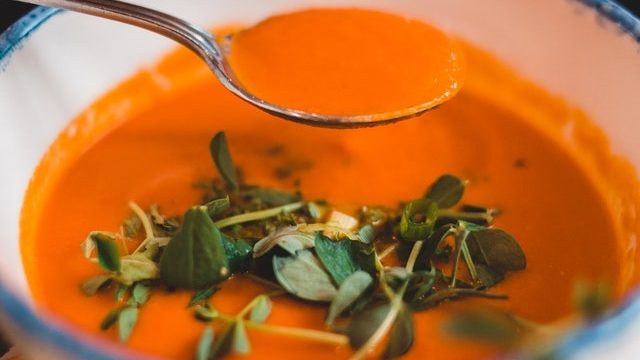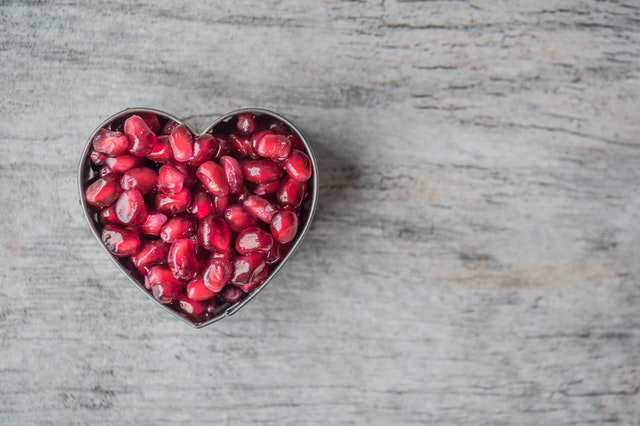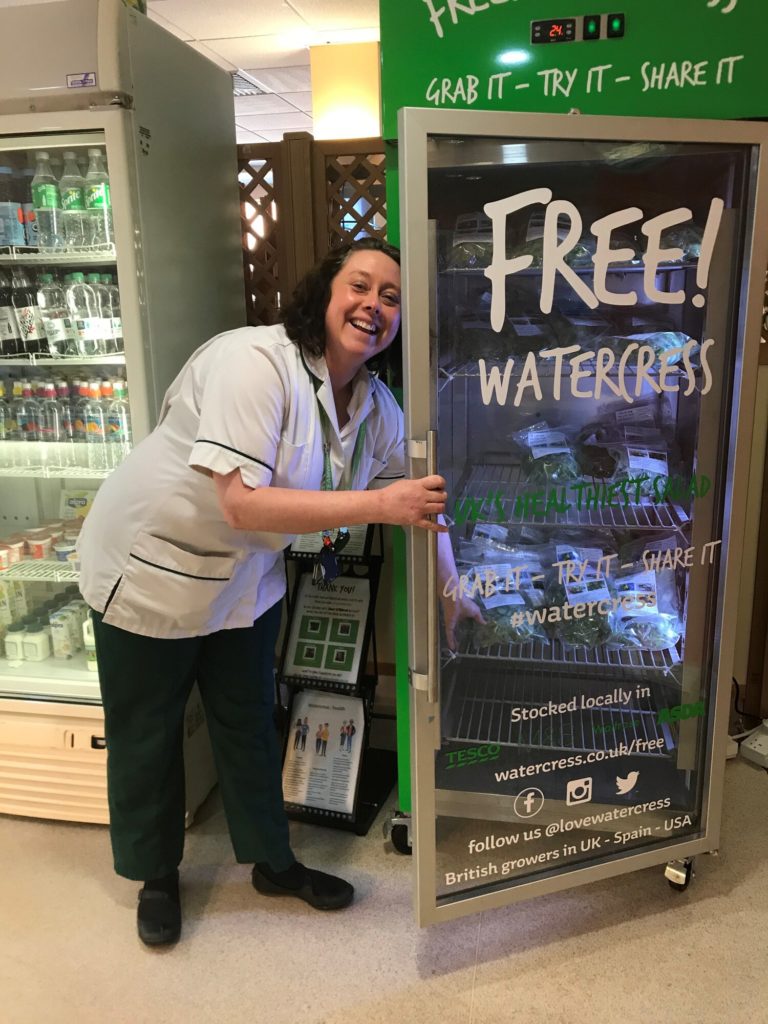SPECIAL REPORT
What you’ll find in this report:






1 in 2 people in the UK and in most nations will be diagnosed with cancer in their lifetime, according to the World Cancer Research Fund (WCRF). Anyone diagnosed with cancer is very likely to ask: “Why me? What could I have done differently?”
Most surgeons will tell a cancer patient that it was “nothing that you did.”
Why then do we keep hearing that our diet has a lot to do with our chances of getting cancer? Is there something in this? If our poor choice of food could give us cancer, can good food choices keep cancer from spreading, coming back or getting it in the first place?
What do the researchers say about cancer prevention and food?

“Many people believe that getting cancer is down to your genes, fate or just bad luck, but there are things you can do to reduce your cancer risk. There’s a lot of confusion these days about what’s healthy and what’s not,” says Dr Giota Mitrou, Director of Research Funding and Science External Relations at WCRF.
According to Dr Mitrou, the research fund’s recommendations are based on the latest research, “so you know you can trust them.”
The fund calls itself a “cancer prevention charity” that funds what it claims is pioneering global research to identify the links between cancer, diet, exercise and weight.
What’s the leading factor that contributes to cancer?
One of the biggest risk factors for cancer is being overweight or obese, according to the WCRF. A high propensity for fat cells in our body can overdose our systems with estrogens, and that’s for men and women. When we have too much estrogen in our system we can be more prone to prostate, breast and uterine cancers, just to name a few.
Eating ‘fast foods’ (such as chips and fried chicken) or other processed foods that are high in fat and sugar (like chocolate, crisps and biscuits) can make you gain weight, and there is strong evidence that being overweight or obese is a cause of at least 12 types of cancer.
World Cancer Research Fund (WCRF)
12 types! That’s an eye-opener. The thing is many freelancers are on demanding daily deadlines, some of us could easily become the central characters of a bad lifestyle poster campaign: late nights, early mornings, too much screen time, food on the go (the packaged kind not the type that falls off trees), sat at a desk all day and a strong reliance on coffee. Sound like you? You’re not alone, but that can change.
Is there really a way to prevent cancer with food?
When anyone is told that they have a tumour or “lesion”, it may shock them into doing a 180-degree lifestyle change. Others may find they are falling into some “stress-induced” habits like turning to comfort food (not mother’s vegetable stew but rather a self-indulged carb and sugar fest) while they are in limbo and wait anxiously for:
- that first biopsy result
- the surgery result
- the oncotype score
- cancer treatment to start
But what if you were told that you could eat food to prevent and in some cases “treat” or prevent cancer without the nasty side effects (hair loss, mood swings, sweats, mouth soars, pain and exhaustion), you’d probably say “sign me up!”
Diets, such as the Mediterranean diet, are high in plant foods – such as fruit, vegetables, whole grains and beans – which can help you stay a healthy weight, and may also protect against certain cancers.
Why, though? Because these foods help keep our hormones in check, like our estrogen and cholesterol levels. Therefore, it is in our best interest, according to experts, to eat foods that counteract the overproduction of any one hormone to keep balanced. Research is also finding certain foods actually have killed cancer cells or inhibited further growth of cancer cells in lab trials.
Some of us may know some of this already, yet may disregard it or make excuses that we’ll cancel out bad habits with a few good ones. It’s not until someone gets diagnosed with cancer that they might really start to look at what they eat and drink.
While the WCRF has some recipes on its site, The Freelance Informer has also done some research into what research and medical sites are reporting about cancer-fighting foods, supplements and lifestyle changes that reportedly pack a punch at cancer.
It’s thinking about what foods or lifestyle behaviours are actually “feeding” cancer cells versus which are actually starving them so they can’t grow.
Check out Dr Hyman’s video below, too.
Pomegranate

In preclinical and animal models, pomegranate has been shown to reduce existing cancer cell growth, induce cell death, prevent blood vessel growth associated with tumours, and inhibit the spread of cancer cells in the body, according to an article published on medical site, Urology of Virginia.
Pomegranate shows promise to help combat some of the most common types of cancer and may potentially boost the effectiveness of existing cancer chemotherapy treatments. More research clearly needs to be done.
Urology of Virginia
Other studies have been conducted in Asia and have also found promising results. In one study pomegranates were showing signs of exhibiting boosting powers very similar to anti-cancer hormone medicine Tamoxifen:
There are several herb/fruit medicines that are being tested in various cancer cells under tissue culture condition and animal models to develop new regimen. Pomegranate is one of them.
Pomegranate (Punica granatum) fruit extracts (PFEs) exhibit a chemopreventive and chemotherapeutic effects, and these effects are possibly exerted through its antiproliferative, apoptotic, anti-angiogenic or anti-inflammatory action.
Pomegranate sensitizes Tamoxifen action in ER-α positive breast cancer cells
Shreya Banerjee, Suman Kambhampati, Inamul Haque, Sushanta K. Banerjee
J Cell Commun Signal. 2011 Dec; 5(4): 317–324. Published online 2011 Jun 27. doi: 10.1007/s12079-011-0138-y
PMCID:
PMC3245758
While studies across different countries are showing promising anti-cancer results by consuming pomegranate juice or supplements, it would be rare if any study ever claimed that anything “cures cancer” 100%, even chemo can’t do that. We have read of patients getting the all-clear after chemo only for it to resurface. But if something can help us prevent cancer by any percentage without side effects then we might all want to look into it.
However, anyone already taking hormone therapy should consult with their doctor about consuming pomegranate in any form and for prolonged periods of time. It would be worth asking them to consult any studies on pomegranate so that they can give you an informed decision.
Graviola/Soursop
This tropical fruit also known as Graviola has some excellent anti-inflammatory qualities, which can help keep your body in check along with some very good nutrients. If you haven’t heard of it before, you’re not alone, it is often imported into the UK from Sri Lanka or Central and Latin America into the US. People describe its taste as a combination of coconut and strawberry with a banana texture when ripe.
While there have been some studies into the fruit’s anti-cancer effects, there are also some concerns over it triggering nerve damage leading to symptoms similar to Parkinson’s disease. That’s a bit concerning.
This is what Cancer Research UK says about the pros and cons of this so-called miracle fruit:
In laboratory studies, graviola extracts can kill some types of liver and breast cancer cells. These cells are resistant to some chemotherapy drugs. A more recent study showed that graviola pulp extract has an effect on prostate cancer cells in mice. But there have not been any studies in humans. So we don’t know whether it can work as a cancer treatment or not.
Many sites on the internet advertise and promote graviola capsules as a cancer cure. But reputable scientific cancer organisations do not support them.
Cancer Research UK

Watercress
University of Ulster scientists revealed as far back as 2007 that including watercress in your daily diet can significantly reduce DNA damage to blood cells, which is considered to be an important trigger in the development of cancer. Smokers, in particular, could benefit when it comes to lung health.
Professor Ian Rowland, who led the research project, said:
Our findings are highly significant. Population studies have shown links between higher intakes of cruciferous vegetables like watercress, and a reduced risk of a number of cancers. However, such studies don’t give direct information about causal effects.
What makes this study unique is it involves people eating watercress in easily achievable amounts, to see what impact that might have on known bio-markers of cancer risk, such as DNA damage. Most studies to date have relied on tests conducted in test tubes or in animals, with chemicals derived from cruciferous vegetables.
The great thing for UK freelancers is this watercress is a homegrown product and could even be grown in a home garden or in patio planters. The superfood has also been studied for its positive impact on those training hard.
In 2020, The Watercress Company wanted to do their bit to support NHS staff during the pandemic so installed a ‘Grab-a-Bag’ fridge in the Damers Restaurant at Dorset County Hospital, Dorchester.
The company said: “Now the [watercress] bags are there exclusively for hospital workers who need fresh fruit and veg to stay healthy and to boost their immune systems as they work under immense pressure, on all our behalves. And it seems staff are loving it!”
Here are some recipes that could inspire you to add watercress to your diet (and some look pretty tasty!)
What’s functional medicine and how does food play a part in it?
In this video, you can listen to cancer survivor and functional medicine expert Elizabeth Boham and Dr Hyman, a medical doctor and best-selling author that has placed nutrition at the heart of his medical practice, discuss which foods are feeding cancer and which are helping starve it. The medical doctors say that many cancer patients feel powerless and in limbo just crossing their fingers that their next scan won’t show something sinister. They suggest that by approaching their diet in a proactive and healthy way they will likely feel more empowered and may even start to see results, as in decreased levels of estrogens and no reoccurrence of cancer at their next check-up.
If you are interested in learning more about intermittent fasting, which has been studied to assess its cell healing powers and ability to keep sugars in check, you might find the following article interesting:
What you need to know about fasting and cancer | CTCA (cancercenter.com)
Are freelancers more prone to getting cancer?
Every person’s propensity for cancer is unique, so while we all may be compelled to go to “Dr Google” to find out other people’s stories, it’s like trying to compare fingerprints. There are, however, proactive measures that we all can take to reduce our chances of getting cancer or having it reemerge.
The World Cancer Research Fund has devised a test to help you see where you might be going right or wrong in preventing your chances of getting cancer, which you can take in the link below:
Cancer Health Check – World Cancer Research Fund (wcrf-uk.org)
Global cancer rates: by country (both sexes)
- According to WCRF, the highest cancer rate for men and women together is in Australia, at 468.0 people per 100,000.
- The age-standardised rate was at least 320 per 100,000 for 12 countries: Australia, New Zealand, Ireland, Hungary, the US, Belgium, France (metropolitan), Denmark, Norway, the Netherlands, Canada and New Caledonia (France).
- The countries in the top 12 come from Oceania, Europe and North America.
| Rank | Country | Age-standardised rate per 100,000 |
|---|---|---|
| 1 | Australia | 468.0 |
| 2 | New Zealand | 438.1 |
| 3 | Ireland | 373.7 |
| 4 | Hungary | 368.1 |
| 5 | USA | 352.2 |
| 6 | Belgium | 345.8 |
| 7 | France (metropolitan) | 344.1 |
| 9 | Norway | 337.8 |
| 10 | Netherlands | 334.1 |
| 11 | Canada | 334.0 |
| 12 | New Caledonia (France) | 324.2 |
| 13 | UK | 319.2 |
| 14 | South Korea | 313.5 |
| 15 | Germany | 313.1 |
| 16 | Switzerland | 311.0 |
| 17 | Luxembourg | 309.3 |
| 18 | Serbia | 307.9 |
| 19 | Slovenia | 304.9 |
| 20 | Latvia | 302.2 |
| 21 | Slovakia | 297.5 |
| 22 | Czech Republic | 296.7 |
| 23 | Sweden | 294.7 |
| 24 | Italy | 290.6 |
| 25 | Croatia | 287.2 |
| 26 | Lithuania | 285.8 |
| 27 | Estonia | 283.3 |
| 28 | Greece | 279.8 |
| 29 | Spain | 272.3 |
| 30 | Finland | 266.2 |
| 31 | Uruguay | 263.4 |
| 32 | Belarus | 260.7 |
| 33 | Portugal | 259.5 |
| 34 | Iceland | 257.8 |
| 35 | Guadeloupe (France) | 254.6 |
| 36 | Puerto Rico | 254.5 |
| 37 | Moldova | 254.3 |
| 38 | Poland | 253.8 |
| 39 | Cyprus | 250.8 |
| 40 | Martinique (France) | 250.8 |
| 41 | Malta | 249.4 |
| 42 | Singapore | 248.9 |
| 43 | Japan | 248.0 |
| 44 | Austria | 247.7 |
| 45 | Barbados | 247.5 |
| 46 | French Guiana | 247.0 |
| 47 | Bulgaria | 242.8 |
| 48 | Lebanon | 242.8 |
| 49 | French Polynesia | 240.6 |
| 50 | Israel | 233.6 |



I found it interesting when you said that cancer cells could be treated by having a healthy diet and lifestyle. A few nights ago, my colleague informed me that he and his family were hoping to find a supplement that could provide healthy cell function for his father who needs a remedy for cancer. He asked if I had any thoughts on the best option to consider. I’m thankful for this enlightening article. I’ll tell him they can consult a health labs for supplements website for more details.